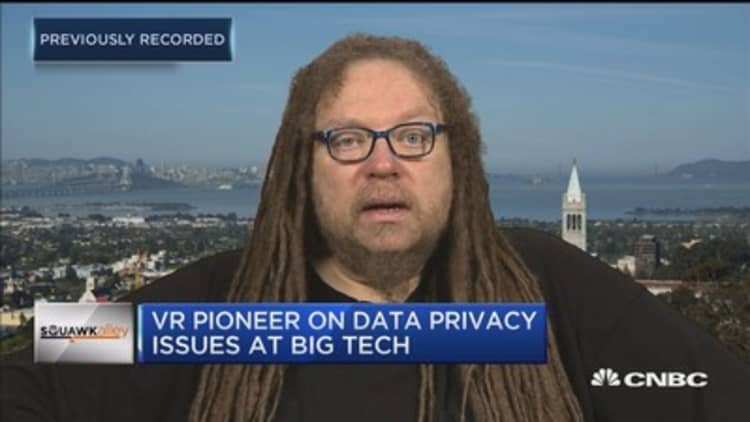
Breaking up technology companies is unlikely to stamp out the unintended dark side of social media — but disrupting the business model might help, according to technology pioneer Jaron Lanier.
"Because of the nature of interactive digital technology, especially on smartphones, advertising gradually turns into something totally different," Lanier told CNBC's "Squawk Alley" on Tuesday. "As it gets more advanced, it turns into direct behavior modification, where everybody is seeing customized information that's tied immediately to what they're doing, and what they've done in their past — to their personality. People start getting pulled apart because they don't see the same news anymore. And I think it destroys society."
Technology companies have been under pressure as regulators around the world have questioned whether their large size and influence has contributed to the spread of misinformation or divisive content.
Lawyers from Facebook, Twitter and Google have been grilled by Congress members over Russian interference in the U.S. election. Alphabet is facing a record antitrust fine in Europe. And the spotlight is unlikely to fade, as regulators scrutinize consolidation in the media industry.
"I don't think breaking up the companies fixes it," Lanier said. "I don't think regulation can really fix it. I think we have to change the financial incentives. The companies actually have to charge for their services, but even more important, people who contribute a lot of value to social networks have to have a chance to earn money back from it..... we have to create a real digital economy, instead of a fake one."
Lanier himself has no active social media accounts, according to his website.
But the fact that big technology companies like Facebook and Google are powered by advertising doesn't come from a place of malice at all, said Lanier, who works at Microsoft (which powers ad-based search engine, Bing, and has faced antitrust scrutiny in the past.)
"There was this very kind of pure-hearted activism — coming from the left, actually, at the dawn of the internet age — saying, 'Everything should be free'," Lanier said. "'We should have free email, free social networking, free news, free, free, free — but at the same time, we love entrepreneurs. We love tech companies. We love Steve Jobs, we love Bill Gates, so we have to combine these two things.' And if you say you want both of those things, the only option left is advertising."
Lanier is known as one of the early leaders of virtual reality technology and released a new book, "Dawn of the New Everything: Encounters with Reality and Virtual Reality." Lanier said he understands why virtual reality may stoke fears of being "trapped inside an advertisement."
But he also noted that society can hardly reject the incredible upside of technological advances. He shared that his wife had a successful cancer procedure, aided by training with experts in a virtual reality tool.
"There's no question that whenever technology becomes more advanced, both the upside and downside get bigger and bigger," Lanier said. "Fundamentally, we need to have a tech business where the incentives are not to manipulate people, but to get productivity from those people to grow the economy. Which is a totally different — really opposite — agenda. If we don't get the incentives right, we really will just creep ourselves into a space that we might not survive."


